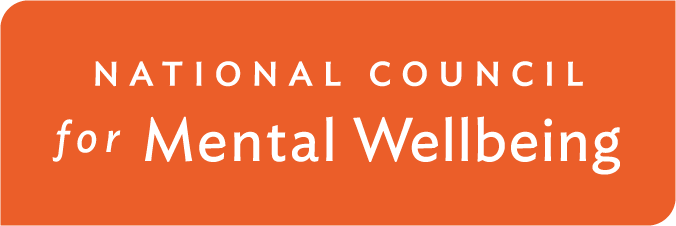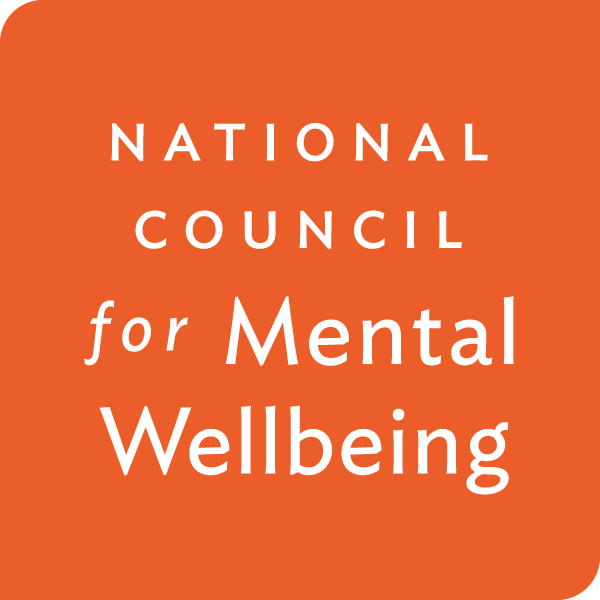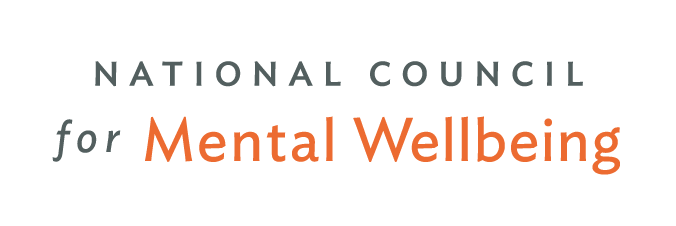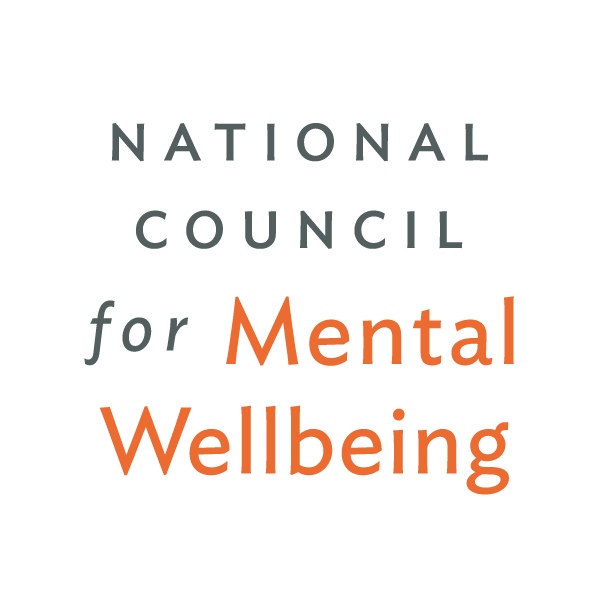Media Kit
Media Contacts
General Inquiries
William Glanz
Media@TheNationalCouncil.org
202-629-5790
Mental Health First Aid
Irene Tung
IreneT@TheNationalCouncil.org
771-215-5853
Media Outreach
To request a quote or placement on our official channels, contact Media@TheNationalCouncil.org.
Boilerplate
When writing about the National Council for Mental Wellbeing in your press releases and other materials, use the official boilerplate description of our organization:
Founded in 1969, the National Council for Mental Wellbeing is a membership organization that drives policy and social change on behalf of more than 3,200 mental health and substance use treatment organizations and the more than 15 million children, adults and families they serve. We advocate for policies to ensure access to high-quality services. We build the capacity of mental health and substance use treatment organizations. And we promote greater understanding of mental wellbeing as a core component of comprehensive health and health care. Through our Mental Health First Aid (MHFA) program, we have trained more than 4 million people in the U.S. to identify, understand and respond to signs and symptoms of mental health and substance use challenges.
If you wish to include more background than what is in our boilerplate, please contact William Glanz at Media@TheNationalCouncil.org.
Logos
Logo Use Rules
- Use only logo files you download from the National Council website or receive directly from us. Do not recreate the logo.
- The logo may not be altered, modified or obscured in any way. It must be used without disturbing or distorting its proportions or otherwise altering the impression it creates.
- Background colors or patterns should never show through the logo.
- The logo cannot be physically incorporated into or connected to any other graphic element — it must stand on its own.
- When used online, the logo must include a hyperlink without a border to https://www.thenationalcouncil.org/.
- The National Council logo should clear a safe distance from any other elements in a composition.
- When locking the National Council logo with those of other organizations, use consistent spacing and sizing. The National Council logo must be the same size as all other logos in the composition.
- The National Council’s white logo must never be used on a white or other light-colored backgrounds. Only use it when the background color is dark and provides enough contrast for the logo to stand out.
- You may use our logo on your website and/or in your reports, but please notify us of your plans in advance.
Logo Versions
- The National Council logo is available with our iconic orange background and with a white background (reversal) in two layouts, horizontal and vertical. The logos are offered in .png and .eps formats.
Download Logos
PNG Logos
- Right-click (or CTRL-click, on a Mac) the images below and choose “Save image as.”




EPS Logos
Our Name
Talking About the National Council for Mental Wellbeing on First Reference
- the National Council for Mental Wellbeing (lowercase t in “the” unless it’s at the beginning of a sentence).
On Second Reference
- the National Council (lowercase t in “the” unless it’s at the beginning of a sentence).
- Do not include “(National Council)” after the full name.
- Do not refer to the National Council as NCMW or NC.
Social Media
When posting about us on your social media account(s), please follow and tag us on the following platforms:
- Facebook: @National Council for Mental Wellbeing
- X (formerly Twitter): @NationalCouncil
- LinkedIn: National Council for Mental Wellbeing
- Instagram: @Nationalcouncil
- TikTok: @National_council
- YouTube: @NationalCouncil
- Threads: @Nationalcouncil
Preferred Language
We use this preferred language guide internally to help with consistency and accuracy to avoid stigmatizing language. We welcome you to adopt any of these preferences.
| mental health and substance use treatment | More accurately describes what National Council member organizations do than “behavioral health.” There are times when “behavioral health” is more accurate, and that judgment is best made by a subject matter expert. |
| substance use challenge | Avoid “addiction” (stigmatizing) and “substance use crisis” (not a commonly used term). |
| wellbeing | One word, no hyphen (not well-being or well being) |
| organization | “Provider” refers to an individual, such as a primary care physician or a psychologist. Organizations such as CCBHCs make up the National Council membership. |
| health care | Two words except in proper names |
| the National Council (second reference) | NOT: NCMW |
| completed suicide or died by suicide/attempted suicide | NOT: committed suicide/unsuccessful suicide |
| living with or experiencing a mental health/substance use challenge | NOT: suffering with mental illness/addiction |
| person in recovery | NOT: ex-addict or clean |
| substance use, substance use challenge | NOT: substance abuse (except when referring to the Substance Abuse and Mental Health Services Administration) |
| person living with a mental illness, mental health challenge or [diagnosis, such as bipolar disorder] | NOT: mentally ill |
| person living with a substance use challenge or substance use disorder | NOT: addict/junkie/druggie |
| person living with alcohol use disorder | NOT: alcoholic/drunk |
Subscribe
Keep up to date on all things National Council. We send regular emails about upcoming events, member spotlights and updates in mental wellbeing.
Grantee-specific Information
Scroll up for information regarding using our logo, tagging us on social media and adding our boilerplate.
Congratulations on receiving support from the National Council for Mental Wellbeing!
We are grateful for all you do and look forward to working with you over the coming months. As a National Council for Mental Wellbeing grantee, you may want to share this news to help promote your great work. This toolkit will help you understand the best way to talk about your National Council support and provide some sample tools that you can download and make your own.
Sharing News About Your Great Work
We want to ensure that YOUR story takes center stage, even when announcing a grant you received from the National Council. To make that happen, we suggest the following guidelines as you prepare a news release or announcement.
It is your decision whether to share the dollar amount of your grant support. If you do, we recommend the following approach to ensure the focus is on the real story — your work:
- We suggest that you do not include grant amounts in the headline.
- We recommend considering a headline such as “[Organization Name] Expands Proven Program to Address [Issue Area]” rather than “[Organization Name] Receives $XX from the National Council for Mental Wellbeing.”
- It is also fine to not share the dollar amount of your grant or investment from the National Council. You can simply use a phrase like “with support from the National Council for Mental Wellbeing,” if you prefer.
Per your grant agreement, we would like to know in advance when you plan to publicize your support from us. Please email William Glanz at Media@TheNationalCouncil.org.
Press Release Template for Grantees
Copy + paste template
PRESS RELEASE: Month XX, Year
Media Contact:
Name
Email Address
Phone
ABC Organization Expands Overdose Prevention Capacity in Oklahoma with XYZ Project
CITY, STATE* (Month XX, Year) — Your opening paragraph will contain your organization’s name, the purpose of the press release (i.e., what you are announcing) and a “hook” (i.e., a problem you seek to solve). Also in the opening paragraphs, it’s a good idea to link to your website and to the National Council’s website.
Example:
ABC Organization is pleased to announce that, thanks to support from the National Council for Mental Wellbeing, Oklahoma has received a tremendous boost in its overdose prevention efforts.
The opioid crisis, coupled with the COVID-19 pandemic, has led to unprecedented rates of overdose death, with more than XXX overdose deaths occurring in Oklahoma alone in the last year. Approximately XX% of the Oklahoma prison population has a substance use disorder or was incarcerated for a drug-related crime, and individuals released from incarceration are at significantly greater risk for overdose in the two weeks following their release compared to the general population.
This grant will help ABC Organization pursue strategies to reduce overdose and other drug-related harms and to prevent or reduce harms related to criminal justice involvement for people who use drugs or people with substance use disorder.
A quote from the organization’s leader is a good following paragraph to personalize the press release and introduce the main contact for the organization or project.
Example:
“This National Council grant will increase our capacity to serve an additional 500 individuals, which is an increase of more than 25%,” said Executive Director of ABC Organization [Name]. “We are grateful for National Council’s commitment to help us protect the health of some of the most vulnerable Oklahomans.”
The next two paragraphs should provide background about your organization, outline the specifics of the program you are announcing, and explain the problem(s) you are addressing. As a suggestion, it’s good to include statistics and concrete data as well as aspirational ideas to tell your story.
Examples:
- The history of your organization.
- Your service area and the individuals you serve.
- The needs in your service area, which are best told with statistics.
- The issue area(s) that your organization is tackling.
- The specific benefits that will come from this program.
- The difference this funding will make.
In the last paragraph, you may want to include an impactful quote, depending on the nature of the press release.
Example:
“Having this support from the National Council means that XX health supplies will be distributed to those who need them most much more quickly and efficiently than we ever could have done alone,” said [Executive Director].
###
At the very end of your release, add your boilerplate (general, evergreen information about your organization). If you quote the National Council, please also add our boilerplate below yours.
About [YOUR ORGANIZATION]
Insert your organization’s boilerplate.
About the National Council for Mental Wellbeing
Insert the National Council’s boilerplate.
*Note: The dateline reflects where the news is taking place. Abbreviate the state name — but use traditional, rather than postal, abbreviations. Note that if a city stands alone in text, the state isn’t used here. (Exception: Washington, D.C.) (See “States and Cities” on this Associated Press Style page for more information.)
- CITY, State (Date) —
- WASHINGTON, D.C. (Jan. 6, 2021) —
- NEW ORLEANS (April 3, 2016) —
